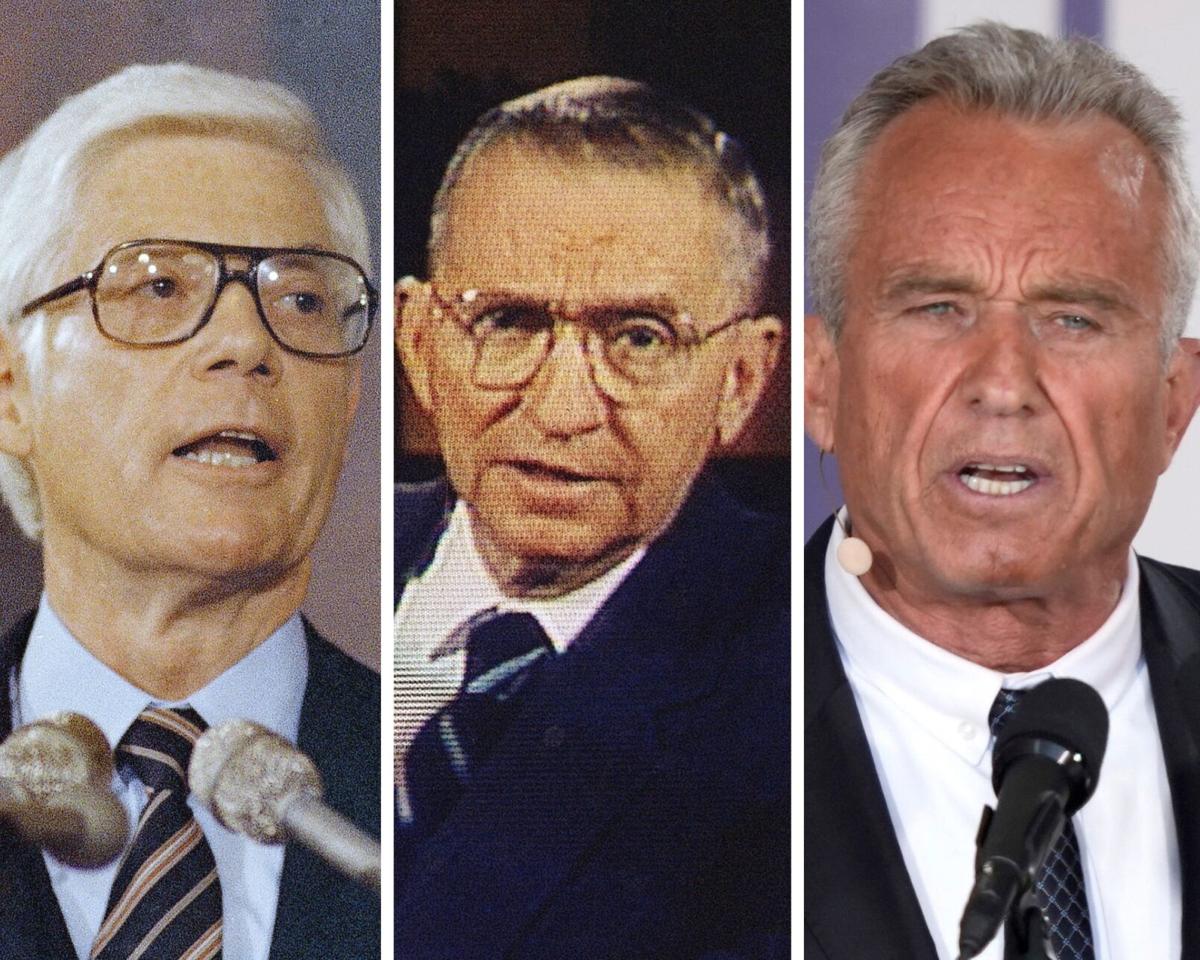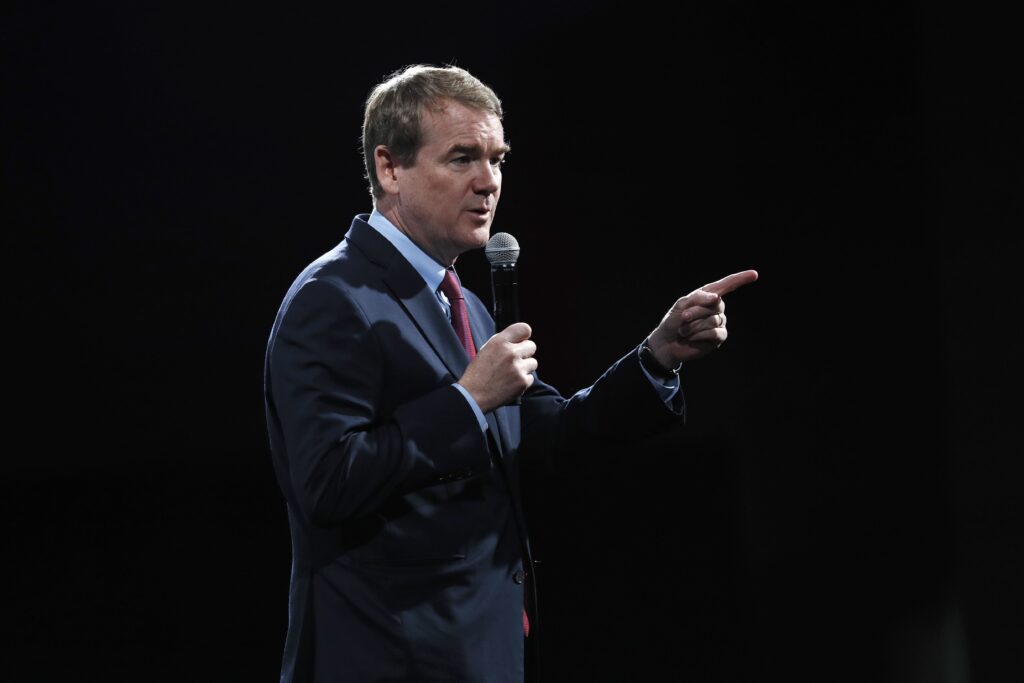RFK Jr. aims to join 3rd party, independent candidates who left a mark in Colorado elections | TRAIL MIX
It’s a safe bet that presidential candidate Robert F. Kennedy Jr. will be on Colorado’s general election ballot this year, though it remains to be seen whether he’ll be listed as an independent or as the Libertarian nominee.
Recent polling shows Kennedy — the son and namesake of 1968 presidential contender Robert F. Kennedy and nephew of former president John F. Kennedy — could pull enough votes to influence the race in a state Democrats have carried by comfortable margins in the last four presidential contests.
If that happens, the environmental attorney and former Democrat will join the rarified ranks of independent and third-party presidential candidates who have made a mark in Colorado elections over the last 100 years.
Although prominent third-party candidates typically perform better in early polling than they do on Election Day, the 2024 presidential election is anything but typical.
With a quarter of voters telling pollsters they’re unhappy with the rematch between President Joe Biden, the Democrat, and former President Donald Trump, the Republican, analysts say this could be the year more voters take an off-ramp and vote for a candidate with one of the country’s most recognizable political names. Or, when it comes time to cast their ballots, voters could do what they usually do and pick between the major party nominees.
Kennedy has two possible routes to the November ballot in Colorado after striking an agreement last week with the state Libertarian Party for its endorsement on the ballot, followed by turning in petitions a week later, hoping to qualify as an independent.
Neither avenue is without obstacles, but there’s a good chance Kennedy will be able to choose which designation he wants in Colorado.
He’ll have to choose, too, should Kennedy qualify for the state ballot under both affiliations. While two states, New York and Connecticut, allow candidates to run on multiple party lines — a Republican can sometimes carry the banner of the Conservative Party, or the Democrat could also be the Working Families Party’s nominee — Colorado law doesn’t permit so-called fusion tickets.
The Colorado Libertarians only decided to list Kennedy as their candidate after passing on the national party’s presidential nominee, Chase Oliver, whose support for COVID protocols and non-surgical gender-affirming care for minors rubbed members of the state party’s board the wrong way.
Some local Libertarians, however, disagreed, declaring that Kennedy may be a lot of things, but he isn’t a Libertarian. Caryn Ann Harlos of Castle Rock, who happens to be the national Libertarian Party’s secretary, earlier this week filed paperwork with the Colorado Secretary of State’s Office designating Oliver and his running mate, Mike ter Maat, as the party’s presidential ticket in Colorado. That drew a strongly worded rebuke from the national party’s chair, Angela McArdle, who told Harlos that she didn’t have the authority to submit the documents and warned that doing so had exposed the party to a possible lawsuit.
The state party has yet to file its forms nominating Kennedy and his vice presidential pick, Nicole Shanahan, but a party spokesman said that should happen once the state and national party sort out their differences.
In the meantime, Kennedy’s campaign kicked off a petition drive with a rally in Aurora in late May that drew more than a thousand supporters to hear Kennedy speak. On July 11, Kennedy organizers submitted boxes to the Secretary of State’s Office containing what they said were 30,148 signatures — more than twice the 12,000 required to make the state ballot as an independent presidential candidate.
There’s no guarantee he’ll qualify — it takes 1,500 valid signatures from registered voters in each of Colorado’s eight congressional districts, a high hurdle even for statewide candidates who collect far more than the total needed.
Kennedy could also face lawsuits challenging his petitions, seeking to knock him off Colorado’s ballot, as has happened in other states, but his dual route means that could be less worthwhile for his opponents.
State Libertarians are hoping that Kennedy decides to run as their nominee, since a strong showing by the candidate could have far-reaching repercussions for the state’s largest minor party.
Under Colorado law, any party whose presidential or gubernatorial nominees receive at least 10% of the vote is recognized as a major political party — a plum status coveted by Libertarians in the state where the party was founded in 1971.
The best a Libertarian presidential nominee has done in Colorado was in 2016, when former New Mexico Gov. Gary Johnson got a little over 5% of the vote while Democrat Hillary Clinton carried the state with 48% to Trump’s 43%.
Kennedy reached into low double digits in a survey released this week by Global Strategy Group, a Democratic firm that has a history of accurately pegging the results in Colorado elections. According to the poll, conducted from June 17 to 24 — before the first debate between Biden and Trump — Biden led with 42% support, Trump had 36% and Kennedy had 12%, with 5% undecided and a couple of other minor candidates totaling 5%. The poll contacted 800 registered voters and had a margin of error of 3.5%.
That’s better than most national polls have shown Kennedy doing in a three-way race against Biden and Trump, but Colorado has a history of supporting third-party and independent presidential candidates at higher levels than they’ve received nationally in recent decades.
Just three minor party candidates have broken into double-digit support from Colorado voters in the last century, and arguably only one swung the results, though he did it twice, in back-to-back elections in the 1990s.
In 1992, eccentric Texas billionaire Ross Perot, running as an independent, received 23.3% of the vote, running a close third behind Republican President George H.W. Bush, who got 35.9%, and Arkansas Gov. Bill Clinton, who with 40% became the first Democrat to win Colorado since the LBJ landslide in 1964.
Perot’s national polling was all over the map in 1992, at one point approaching 35%, including in a couple of polls that showed him leading both major party candidates. But Perot’s polling took a dive over the summer after he abruptly quit the race, later floating the bizarre claim that he had dropped out because the Republicans were planning to disrupt his daughter’s wedding. In early October, he changed his mind again and restarted his candidacy, eventually winning 18.9% of the vote nationally.
Perot ran again four years later on the Reform Party ticket — a year after founding the party — but never reached the same heights he had in his first campaign. Nationally, he received 8.4% of the popular vote in 1996, beating the 6.6% he got in Colorado, but that same year Kansas Sen. Bob Dole just barely beat the Democratic incumbent, Clinton, 45.8% to 44.4%, a difference far narrower than Perot’s vote.
The previous double-digit showing by a third-party candidate in Colorado was in 1980, when John Anderson, a Republican congressman from Illinois, launched a campaign as an independent after doing poorly in early GOP primaries that spring. Facing beleaguered Democratic President Jimmy Carter and former California Gov. Ronald Reagan, the Republican nominee, Anderson polled in the 20% range into the early summer but saw his support dwindle as the election approached. Running on the National Unity ticket, Anderson received just 6.6% nationally but did much better in Colorado, winning 11% of the vote. That share didn’t affect the final result, however, as Reagan scored a landslide 55% of the vote to Carter’s anemic 31%.
The only other time in the last 100 years when a third-party presidential candidate made it interesting in Colorado was in 1924, when Robert La Follette, a former Republican governor of Wisconsin running on the Farmer-Labor Party ticket, finished just behind Democrat John Davis while Republican Calvin Coolidge won the state in a landslide. La Follette received just over 20% of the vote to Davis’ 22%, both far behind Coolidge’s 57%.











